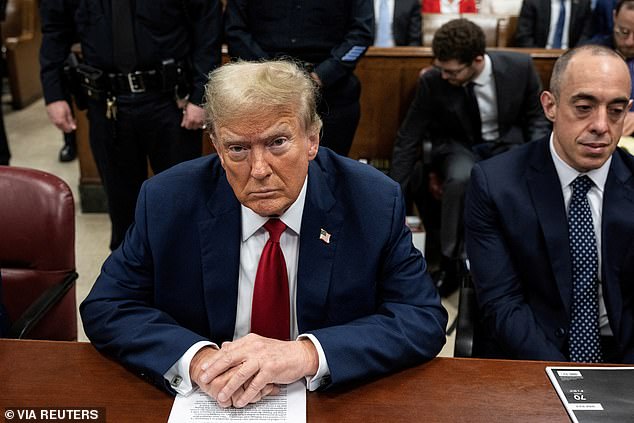The reason why you may have to pay MORE tax in 2026
Donald Trump-era tax breaks are set to expire next year, meaning millions of Americans may have to pay more in 2026.
Trump introduced sweeping changes to the tax landscape in 2017 through the Tax Cuts and Jobs Act (TCJA).
This included lowering individual income tax rates, nearly doubling the standard deduction and increasing the federal estate tax exemption. Corporate tax was also reduced to 21 percent, the lowest level since 1993.
However, these cuts will expire on January 1, 2026 – a date that financial experts are calling ‘Sunset day’.
Howard Gleckman, senior fellow at the Urban-Brookings Tax Policy Center, told CNBC the coming changes are “huge,” he said: “Almost the entire personal income tax code will be on the table by the end of 2025.”
Trump made sweeping changes to the tax landscape in 2017 through the Tax Cuts and Jobs Act (TCJA). However, these cuts will expire on January 1, 2026 – a date that financial experts are calling ‘Sunset day’.
When the TCJA expires, income tax brackets could return to pre-2017 levels — which were nearly 3 percent higher.
Rates could rise from 10%, 12%, 22%, 24%, 32%, 35%, 37% this year to 10%, 15%, 25%, 28%, 33%, 35% and 39.6 % in 2026.
These cuts have saved the average American household $1,600 each, according to U.S. State Department estimates Center for Tax Policy.
Both Biden and Trump have suggested they would expand TCJA provisions for the middle class, but it’s not clear exactly what this would look like, or if they would only stick to certain measures.
A full expansion of the TCJA could add an estimated $4.6 trillion to the already looming national deficit over the next decade.
If the TCJA is not extended, the lower rates and broader tax brackets will have the biggest impact.
The expiration of the TCJA would impact “virtually all aspects of the tax code and the vast majority of American taxpayers,” Erica York, senior economist and research manager at the Tax Foundation’s Center for Federal Tax Policy, told CNBC.
Trump has not confirmed whether or not he will extend the TCJA and experts are divided on whether he will. A research note from Capital Economics said there is little “room” for Trump to be so generous.
It’s also possible that Biden will extend many of the cuts, but he has made clear he plans to raise corporate taxes to 28 percent.

Trump has not confirmed whether or not he will extend the TCJA and experts are divided on whether he will
The TCJA also doubled the lifetime wealth tax deduction from the 2017 value of $5.49 million for individuals to $11.18 million – and this has continued to rise in subsequent years.
Under current rules, an individual can transfer $12.92 million and a married couple can transfer $25.84 million to heirs before being hit with federal estate taxes.
If the TCJA is repealed, the exemption could effectively be cut in half, leaving an individual with a taxable estate worth more than about $7 million subject to federal estate taxes if they don’t plan ahead.
When the TCJA expires, the standard deduction could fall back to 2017 levels, almost half of what it is today.
This could mean more people will have to itemize their deductions when filing their returns in 2026 to reduce their taxable income.
Before 2018, only 70 percent of people claimed the standard deduction. In 2020, this increased to 90 percent with the higher allowance, according to the Tax Policy Center.
